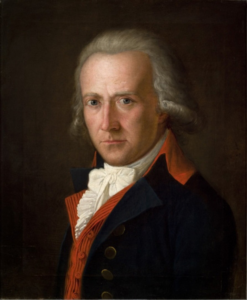In memoriam / Offering to the dead
(Poet's title: Erinnerung 1793 / Todtenopfer)
Set by Schubert:
D 101
[April 1814]
Kein Rosenschimmer leuchtet dem Tag zur Ruh;
Der Abendnebel schwillt am Gestad empor,
Wo durch verdorrte Felsengräser
Sterbender Lüfte Gesäusel wandelt.
Nicht schwermutsvoller tönte des Herbstes Wehn
Durchs tote Gras am sinkenden Rasenmal,
Wo meines Jugendlieblings Asche
Unter den trauernden Weiden schlummert.
Ihm Tränen opfern werd ich beim Blätterfall,
Ihm, wenn das Mailaub wieder den Hain umrauscht,
Bis mir, vom schönern Stern die Erde
Freundlich im Reigen der Welten schimmert.
No rosy glow lights up the day as it goes to rest.
The evening mist swells up on the beach,
Where, amongst withered grasses amongst the stones,
Dying breezes whisper as they pass.
The winds of autumn did not ring out as melancholy as this
Through the dead grass by the sinking grassy mound
Where the ashes of the darling of my youth
Sleep under the weeping willows.
I shall offer tears for him when the leaves fall,
And also when the foliage of May rustles again through the grove,
Until, from a more beautiful star, the earth
Shines on me in a friendly way in the dance of the spheres.
All translations into English that appear on this website, unless otherwise stated, are by Malcolm Wren. You are free to use them on condition that you acknowledge Malcolm Wren as the translator and schubertsong.uk as the source. Unless otherwise stated, the comments and essays that appear after the texts and translations are by Malcolm Wren and are © Copyright.
☙
Themes and images in this text:
Autumn By water – beaches and general Dancing Evening and the setting sun Going to bed Grass Graves and burials Leaves and foliage Light May Mist and fog Stars Tears and crying Weeping willows Wind Woods – groves and clumps of trees (Hain) Youth
The poet was 21 years old (the year was 1782) when his schoolfriend Jakob Friedrich Rosenfeld fell on the ice in Dessau and died. Matthisson used two different titles for his poem, written 11 years after the accident: ‘Erinnerung’ (In memoriam / Remembrance) and ‘Todtenopfer’ (Offering to the dead / Sacrifice for the dead).
The text begins by inverting the convention of contemplating the promise of a new dawn (and consequently resurrection) as the poet looks at the setting sun. On this occasion there is no red glow to serve as a spark to light up tomorrow’s sun. There is no taper or candle that we can take with us as we go to our bed and keep as a night light. There are no embers that will continue to glow through the darkness from which tomorrow’s fire can be lit. What there is is evening mist coming off the water and engulfing us. The grass is withered and the breezes are dying. This is a dying day which recalls the loss of Rosenfeld’s death acutely. There is no ‘rose’ light and the ‘field’ (Rosenfeld / field of roses) consists of withered grass. Rosenfeld is not here. He is dead.
It is worse now than it was when he was buried and the earth settled down over his body. The grief is getting worse. It is an autumnal pain (the second and third stanzas use the imagery of the year rather than of the day to refer to the human life cycle). The poet is aware that mourning will continue all the way from fall to spring. Although new leaves will rustle through the grove in May there is no prospect of recovery then. In order to get over the loss the poet himself will need to have entered another sphere. When he is himself dead he might perceive the world where we are now trapped from a different perspective. Instead of invoking a ‘music of the spheres’ which will become audible in that other dimension, he envisages a ‘dance of the worlds’ that is only perceptible after death. There might then be a ‘friendly glow’, but back here, tonight, there is only gloom. There is no rosy light because there is no Rosenfeld.
☙
Original Spelling and notes on the text Erinnerung. 1793 Kein Rosenschimmer leuchtet dem Tag zur Ruh'! Der Abendnebel schwillt am Gestad' empor, Wo durch verdorrte Felsengräser Sterbender Lüfte Gesäusel wandelt. Nicht schwermutsvoller tönte1 des Herbstes Wehn Durchs todte Gras am sinkenden Rasenmal, Wo meines Jugendlieblings Asche Unter den trauernden Weiden2 schlummert. Ihm Thränen opfern werd' ich beim Blätterfall, Ihm, wenn das Mailaub wieder den Hain umrauscht, Bis mir, vom schönern Stern, die Erde Freundlich im Reigen der Welten schimmert. 1 Schubert changed 'bebte' (stirred) to 'tönte' (rang out) 2 Schubert changed 'Unter der trauernden Weide' (under the weeping willow) to 'Unter den trauernden Weiden' (under the weeping willows)
Confirmed by Peter Rastl with Schubert’s source, Gedichte von Matthisson. Neueste verbesserte Auflage. Wien und Prag bey Franz Haas 1810. page 146; with Gedichte von Friedrich von Matthisson. Erster Theil. Tübingen, bei Cotta, 1811, page 290, and with Friedrich von Matthisson, Gedichte, fünfzehnte Auflage. Zurich: Orell, Füssli & Co., 1851, page 227.
First published in Der Neue Teutsche Merkur vom Jahre 1794. Herausgegeben von C. M. Wieland. Erster Band. Weimar 1794. 4. Stück. April 1794, page 318.
Note: Matthisson changed the title into Todtenopfer (Offering to the dead) in the 1811 and subsequent editions.
To see an early edition of the text, go to page 146 [154 von 296] here: http://digital.onb.ac.at/OnbViewer/viewer.faces?doc=ABO_%2BZ169509602


